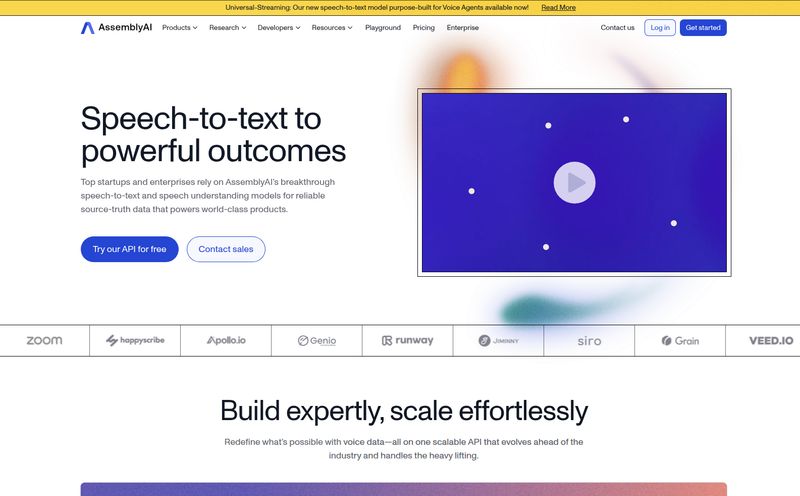We've all been there. It's 5 PM on a Friday, you've just wrestled a monstrous bug into submission, and the only thing standing between you and freedom is that little commit message dialog box. What do you type? "bug fix"? "stuff"? "wip"? We've all committed these cardinal sins of version control.
Writing meaningful commit messages is one of those things that's incredibly important for team collaboration and your future self, but it's also a real pain in the neck. It's a classic case of knowing what you should do, but lacking the mental energy to actually do it. For years, I've thought there has to be a better way. And with the explosion of AI tools, it seems like that 'better way' might finally be here.
I’ve been testing out a bunch of AI-powered coding assistants lately, and one that kept popping up on my radar was AICommit, a plugin for the JetBrains suite of IDEs. With over 12,000 downloads and a slick 4.5/5 rating on the marketplace, my curiosity was definitely piqued. Is this the tool that finally saves us from our own lazy commit messages? I installed it to find out.
So What Is AICommit, Really?
At its core, AICommit is an AI-powered programming assistant built to live inside your favorite JetBrains IDE (think IntelliJ IDEA, PyCharm, WebStorm, etc.). While its name screams "commit messages," that's really just the headline act. It’s more like a Swiss Army knife for common coding tasks that often get overlooked or feel like a chore.
It’s not trying to be a full-blown pair programmer like GitHub Copilot, which is constantly suggesting code as you type. Instead, AICommit feels more like an on-demand consultant. You write your code, and when you're ready, you can ask it to help with specific tasks. It’s a subtle but important difference in workflow.
The Killer Feature: Finally, Sane Commit Messages
Okay, let's talk about the main event. The automatic commit message generation. This is the feature that will draw most people in, and for good reason. The process is simple: you make your code changes, stage them in Git, and then instead of agonizing over what to write, you click a little button. AICommit analyzes your changes—the additions, the deletions, the modifications—and proposes a well-formatted, conventional commit message.

Visit AICommit
I was skeptical at first. I've seen 'smart' tools that are anything but. But I have to say, I'm impressed. It consistently produces messages that are not only accurate but also follow best practices. No more "fixed stuff," but rather something like: "feat(user-auth): Implement password reset token validation." It’s a small thing, but over the course of a project, the clarity it adds is immense. It's a huge mental load off my shoulders.
Beyond the Commit: What Else is in the Box?
This is where AICommit surprised me. I came for the commit messages, but I might stay for the other goodies. It's got a whole suite of features that turn it from a one-trick pony into a genuinely useful sidekick.
Code Optimization and Explanation
Ever written a function and thought, "There has to be a cleaner way to do this"? AICommit has a code optimization feature that does just that. You can highlight a block of code, and it will suggest ways to make it more efficient or readable. It's like having a patient senior dev on call for a quick code review. The 'Code Explanation' feature is the other side of that coin. Got dropped into a legacy project with some truly arcane functions? Ask AICommit to explain it to you in plain English. It's fantastic for getting up to speed on an unfamiliar codebase.
Documentation and Code Conversion
Two more developer chores I absolutely loathe: writing documentation and translating code from one language to another. AICommit tackles both. The documentation generator can create DocStrings or comments for your functions, saving you a ton of tedious typing. The code conversion is a bit of a party trick, but a surprisingly handy one. I've used it to quickly convert a Python script into a JavaScript snippet for a web project, and while it wasn't perfect, it got me 90% of the way there in seconds. That's a win in my book.
Bring Your Own Brain: Multi-AI Platform Support
Here's a detail I really appreciate: AICommit doesn't lock you into a single AI provider. You can plug it into OpenAI (the folks behind ChatGPT), Microsoft's Azure AI, or Google's Gemini. This is smart. A lot of developers and companies might already have credits or preferred pricing with one of these platforms. This flexibility means you can use whatever model you have access to or prefer. It also future-proofs the tool a bit; if a new, better model comes out from one of these providers, you can probably just switch over to it.
The Good, The Bad, and The AI-Generated
No tool is perfect, right? After using AICommit for a while, here's my breakdown of the good and the not-so-good.
The Things I Liked
The time savings on commit messages alone is almost worth the price of admission (more on that in a sec). The extra features, especially the code explanation and optimization, are genuinely useful for both learning and productivity. I also give them major points for their privacy-conscious approach; they state that processing happens locally and communications are encrypted. In a world where you're sending your precious source code to a third party, that's a big deal.
The Potential Downsides
The biggest weakness is also its strength: it relies entirely on external AI services. If your chosen AI provider (like OpenAI) has an outage, your fancy plugin becomes a brick. Secondly, the quality of the output is only as good as the underlying AI model. If the AI gives a lazy or incorrect answer, you have to be experienced enough to spot it. It’s an assistant, not a replacement for your own brain. And like any IDE plugin, there's always the chance that an update to your IDE could temporarily break it until the plugin developer catches up. It's the nature of teh beast.
Let's Talk Money: The AICommit Pricing Mystery
So, what does all this cost? I went to their website, clicked around, and... found a 404 error on their pricing page. At first I was confused, but I think I've figured it out. It appears AICommit itself is a free plugin. The cost comes from the AI you hook it up to. It follows a "Bring-Your-Own-Key" (BYOK) model. You get an API key from OpenAI, Azure, or Google, plug it into the AICommit settings, and you're billed by that provider based on your usage. For most developers, the amount of text sent for commit messages and code snippets will result in a monthly bill of just a few dollars, if that. It's a fair model that keeps the cost directly tied to how much you use it.
FAQ: Your Questions, Answered
- Is AICommit free to use?
- The plugin itself appears to be free to download and install from the JetBrains Marketplace. However, you need to provide your own API key for an AI service like OpenAI or Google Gemini, which you'll be billed for based on your usage.
- Does AICommit see my private source code?
- Yes, to analyze your code for commits or optimization, it has to send that code to the AI service you've connected. AICommit states that their process is privacy-focused with local processing and encrypted communications, but you should always be mindful of your company's policy on using third-party tools with proprietary code.
- Which JetBrains IDEs does it work with?
- It's available on the official JetBrains Marketplace, which means it should be compatible with the entire modern family of IDEs, including IntelliJ IDEA, PyCharm, WebStorm, Rider, GoLand, and others.
- How does it compare to GitHub Copilot?
- They solve different problems. GitHub Copilot is primarily an autocomplete tool that suggests code as you type. AICommit is more of an on-demand tool for tasks after you've written the code, like generating commits, writing documentation, and refactoring. They can actually work quite well together.
- Do I need to be an AI expert to set it up?
- Not at all. The setup involves creating an account with a provider like OpenAI, grabbing your API key (which is just a long string of text), and pasting it into the AICommit settings in your IDE. It's a five-minute job.
Final Thoughts: Is AICommit Worth Installing?
So, what's the verdict? For any developer using a JetBrains IDE, I'd say giving AICommit a try is a no-brainer. It tackles a real, persistent pain point—writing good commit messages—and does it very well. The additional features are more than just chrome; they're genuinely useful tools that can speed up your workflow and even help you learn.
It’s not magic. You still need to be a developer. You still need to review what the AI suggests. But as a companion, an assistant that handles the tedious bits so you can focus on the hard problems? It's pretty darn good. It has certainly earned a permanent spot in my IDE.
Reference and Sources
- AICommit Official Website
- AICommit on the JetBrains Marketplace
- OpenAI API Pricing
- Google AI Platform Pricing



